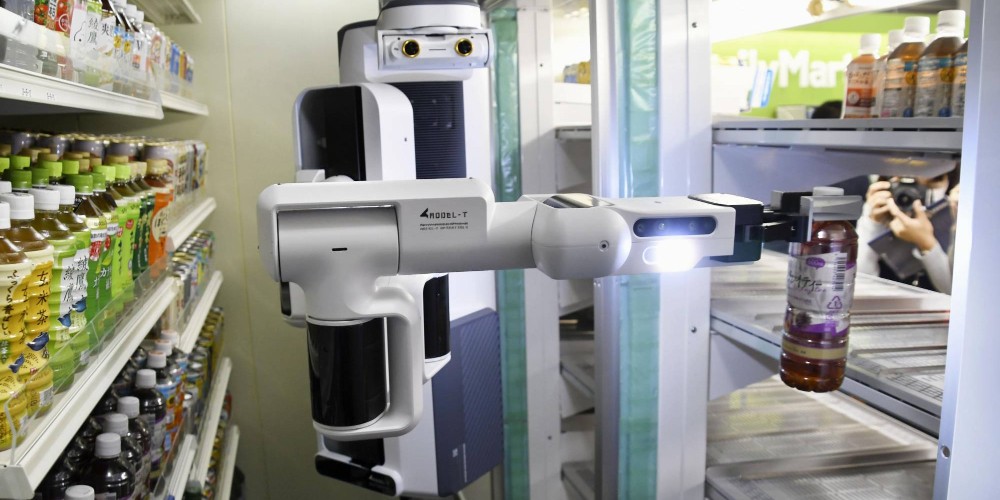Robots are set to replace human workers as shelf stockers in a Japanese convenience store chain.
Convenience store company FamilyMart collaborated with Tokyo-based Telexistence to deploy these robots called TX Selective Compliance Assembly Robot Arm (TX SCARA) in 300 locations across the country. The robot arms designed to replenish drinks in refrigerators are now in mass production, according to the technology firm.
“TX SCARA was created to do the specific task of restocking refrigerated shelves with bottles and cans – a repetitive, tedious job generally performed by employees in often uncomfortable settings,” Telexistence said in an Aug. 10 statement.
“TX SCARA operates 24/7, replenishing shelves to completely remove the task from store staff. The introduction of robots and its AI system will create time surplus without adding employees, and the time can be reallocated to customer service and shop floor enhancement, leading to higher quality work environment and store operations.”
The robots can work without human assistance 98 percent of the time, with a remote piloting option available in case the artificial intelligence fails or encounters out-of-place items. Each TX SCARA unit can replace one to three hours of daily work by humans in every store where it is deployed. Telexistence said the deployment of the robots served a two-fold purpose: Help relieve store workers and fill a void left by Japan’s shrinking workforce.
“The decline in Japan’s labor population is one of the key management issues for FamilyMart to continue stable store operations,” said the company’s general manager Tomohiro Kano. He added that the newly created time as a result of adopting TX SCARA “can be reallocated to customer service and shop floor enhancement.”
Coffee the Christian way: Promised Grounds
FamilyMart, which has 16,000 convenience stores in its home country, will pay Telexistence a monthly fee for the robot stocker’s labor and maintenance. The fee will also include the support of remote workers who can pilot the TX SCARA unit using a virtual reality headset when needed.
Robots also replacing human cooks in fast food chains
The trend of robots replacing human workers is not limited to Japan. In fact, restaurants in the U.S. have followed the practice. Layoffs prompted by the pandemic and the inability to fill these job vacancies prompted several companies to turn to robots instead. (Related: Restaurants look to ROBOTS to fill openings amid labor shortage.)
Fast food chain White Castle was among the companies who jumped on the bandwagon, with its robotic fry cook named Flippy. The robot arm – who mans the fry station in the joint’s No. 42 branch in Merrillville, Indiana – worked 23 hours a day, with an hour reserved for cleaning and maintenance. Flippy’s main tasks involve handling fries, cheese sticks, onion rings and other side items.
According to Jamie Richardson, White Castle’s vice president of corporate relations, Flippy was not just a gimmick to attract more diners. Its dedicated tasks gave its human colleagues more time to focus on customers.
“If you know you’ve got the fryer covered, it frees you up to have the right person taking orders in the dining room or the drive-thru,” he said.
Mexican fast food chain Del Taco followed suit with a machine that fills customers’ drink orders. According to Del Taco’s Vice President for Operations Innovation Kevin Pope, the machine seeks to automatically prepare a diner’s chosen drink – shaving seconds off the time needed to fulfill every order.
The machine takes a cup, fills it with ice and pours in the appropriate beverage afterward. It then covers the cup with a lid and delivers the finished drink at the end of a conveyor belt. Human crew members would only have to grab the drink instead of making it themselves.
Robots.news has more stories about robots replacing human workers.
- Concerned about your life’s savings as the multiple challenges decimate retirement accounts? You’re not alone. Find out how Genesis Precious Metals can help you secure your wealth with a proper self-directed IRA backed by physical precious metals.
Watch this video about a restaurant in Japan staffed by robots.
This video is from the Vigilent Citizen channel on Brighteon.com.
More related stories:
- Japanese researchers develop a prototype humanoid robot aimed at eventually replacing human laborers.
- RULED BY SILICON: Airports turn to ROBOTS to enforce COVID protocols as air travel normalizes.
- Robots now automating the harvesting of cucumbers in Germany.
- Your barista is being replaced by a robot, already in use in Japan.
Sources include:

It’s becoming increasingly clear that fiat currencies across the globe, including the U.S. Dollar, are under attack. Paper money is losing its value, translating into insane inflation and less value in our life’s savings.
Genesis Gold Group believes physical precious metals are an amazing option for those seeking to move their wealth or retirement to higher ground. Whether Central Bank Digital Currencies replace current fiat currencies or not, precious metals are poised to retain or even increase in value. This is why central banks and mega-asset managers like BlackRock are moving much of their holdings to precious metals.
As a Christian company, Genesis Gold Group has maintained a perfect 5 out of 5 rating with the Better Business Bureau. Their faith-driven values allow them to help Americans protect their life’s savings without the gimmicks used by most precious metals companies. Reach out to them today to see how they can streamline the rollover or transfer of your current and previous retirement accounts.


